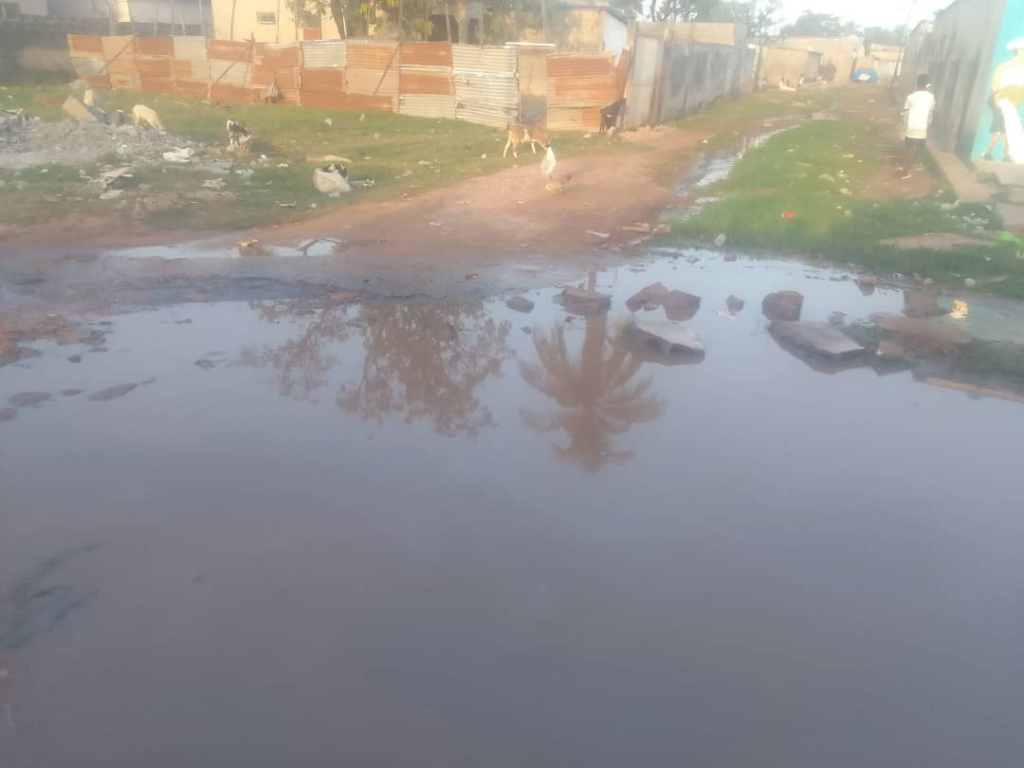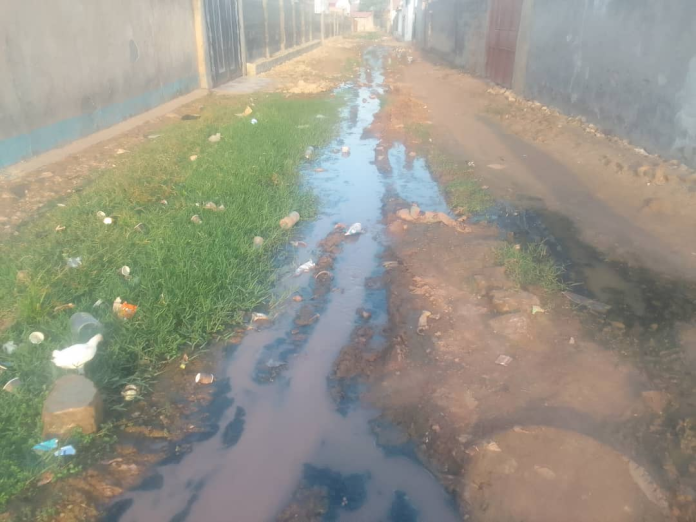By Nelson Manneh
The Director of Public Health Services at the Ministry of Health, Dr Manjang, recently spoke to Foroyaa to elucidate the impact of the violation of the country’s environmental health laws.
Dr. Manjang’s intervention in a telephone interview with this reporterlast Sunday, 7 January 2024, following an earlier publicationon Foroyaa concerning the digging of holes by certain landlords at the bottom of their fences, in order to allow the flow of sewage water into the streets.
According to Dr. Manjang, the above act by certain landlords is a serious violation of the country’s environmental health laws and calls on the public to report such matters to Public Health Officers nearest to them.
This reporter visited Tallinding-Coloban, New Jeshwang,EboTown, Bundung Borehole, Nema, Abuko, Fajikunda, and Bakau, and discovered that most of the streets in these areas are affected with filthy and stinking waste water coming from residencies, into the streets.
In some areas, residents endure the stinking waste water in an environment that is unfit for human habitation.Some of the residents who spoke to this medium alleged that the landlords of certain compounds willingly open the manholes of their compounds, to allow sewage water to flow into the streets. They complained that their representatives at Council and National Assembly levels have neglected this important issue as if it is not a concern.
“There are laws governing this inhumane act, and if I can remember, there is an Anti-Littering Act. This Act describes such inhumane activities as offenses but I have never heard of any person prosecuted for doing such,” one Mariatio Colley, a native of Fajikunda told this reporter.
The Anti-Littering Regulations, 2007
The Anti-Littering Regulations, 2007, described litter as ‘‘any substance or object, whether or not intended as waste, when deposited in a place other than a litter receptacle or other place lawfully designated for its deposit, is or is likely to become unsightly, nauseous or unsanitary, whether by itself or with any other substance or object, and regardless of its size or volume’.’
The Anti-Littering Regulations 2007 talks about Littering in Public Places and the General offenses related to littering. Part 3 (1) states that a person shall not deposit or cause the deposit of litter in a public place or in any place that is visible to any extent from a public place; (2) a person shall not: (a) deposit anything that is commercial, household, industrial or municipal waste in any place for collection by, or on behalf of a local authority or by another person, or (b): load, transport, unload or otherwise handle or process anything or carry on a business, trade or activity, in such circumstances as to create litter or lead to litter in any public place or any place that is visible to any extent, from a public place, (3) a person shall not move or interfere with a litter receptacle that has been provided by a local authority or other person unless the movement or interference is authorised by the local authority or person, (4) a person who contravenes the provisions of this regulation commits an offence and is liable upon conviction, to a fine of not less than one thousand Dalasi or more than five thousand Dalasi, 4(1) a person shall not sweep into or deposit in any gutter, street or other public place, the accumulation of litter from any building or lot or from any public or private sidewalk or driveway; (2) the owner or occupier of a property shall keep the sidewalk in front of his or her premises free of litter; (3) a person who contravenes the provisions of this regulation commits an offence and is liable upon conviction, to a fine of not more than five thousand Dalasi.
The Anti-Littering Regulations, 2007 also gives local authorities the powers to ensure that each public road or area within its jurisdiction is so far as practicable, kept free of litter.
The Law indicates that: ‘‘a) local authorities shall: (i) take all measures to prevent the creation of litter in its jurisdiction; (ii) control and ensure the disposal of litter;
b) A local authority may for the purposes paragraph (i), enter into arrangements with, or assist any other person, including a local authority, for or in the taking of those measures on behalf of the authority.”
Residents of Various Communities Raise Their Concerns:

In Bundung Borehole, one Dodou Bah told Foroyaa: “Our institutions are weak.The Gambia is very good at drafting laws but implementing them is the problem. Our representatives both at Council and Parliament do not focus on things affecting us and our livelihoods on a daily bases.’’
Mr Bah explain that during the raining season in Bundung Borehole, individuals deliberately open the man holes in their compounds to allow sewerage to flow freely into the streets, which he said inundates the streets in their area with puddles of filthy sewage water.
This reporter also observed the channels or holes burrowed at the bottom of the walls of most compounds which allows the free flow of raw sewerage into the streets.
“I have complained about this issue on different platforms but nobody has taken it up seriously.In fact, some people do it deliberately because they know that there will be no implication for them,” Bah said.
Isatou Camara of Nema also said that some streets in Nema stay inundated and wet the year round with raw sewerage, adding that “this has a lot of health implications especially for everyone, particularly children”, who she said continue to play in these dirty pools of water as they are innocent and donot know the implications of what they are doing.
“It is the responsibility of the authorities to ensure that the environment is protected. There are laws governing the environment, and these laws need to be implemented to the letter in order to protect the people,” she said.
Samba Gassama of Abuko said their children always come out in the streets marred by dirty waste water, exposing them to several infections and illnesses.
“In our area, I think some of these compound owners have no concern because it is sinful for someone to allow the free flow of such dirty water from their compounds, into the streets,” he said.
Mr Gassama continued: “We need a proper waste management system and the authorities should condemn such and ensure there are appropriate places identified for the disposal of waste.”
When contacted for comments, the Councillor of Tallinding South, Babacarr Mansally, acknowledged that some residents burrow holes on the walls of their fences to allow the flow of waste water into the streets from their compounds, which he said is a big concern that needs urgent redress.
“I once raised the issue at Council level but there was no follow up to ensure that the issue is curtailed and addressed once and for all. I will continue to advocate for it to end even if it requires legal action to be taken on perpetrators,” Councillor Mansally said.
Enforcement of Public Health Measures Against the Insanitary Management Of Sanitary Tank Trucks
Meanwhile, the Government of the Gambia through the Ministry of Health, recently dispatched a press release warning against some of the violations of Public Health Act of 1990.
According to Dr Manjang, the Ministry of Health noticed with concern that certain sanitary tanker trucks that collect and transport liquid waste (sewage) from communities to treatment sites, do not practise diligent public health measures to avoid spillage within the streets.
“This is a serious threat to public health because it has the potential to spread infectious and vector-borne diseases. The Ministry of Health strongly advises those engaged in this business to ensure that proper sanitary measures are adhered to, for the promotion of the healthy well-being of all and sundry,” he said.
He said the Public Health Act of 1990 gives powers to Public Health officers within the country,to monitor such activities within their respective jurisdictions and impound any sanitary tanker truck that is non compliant with the prescribed public health measures. He said all sanitary tank truck operators should inspect their tanks and avoid leakages during collection and transportation of sewage, and avoid overloading their trucks during the collection of sewage, and should also possess adequate knowledge of the proper maintenance of their tanks.




















